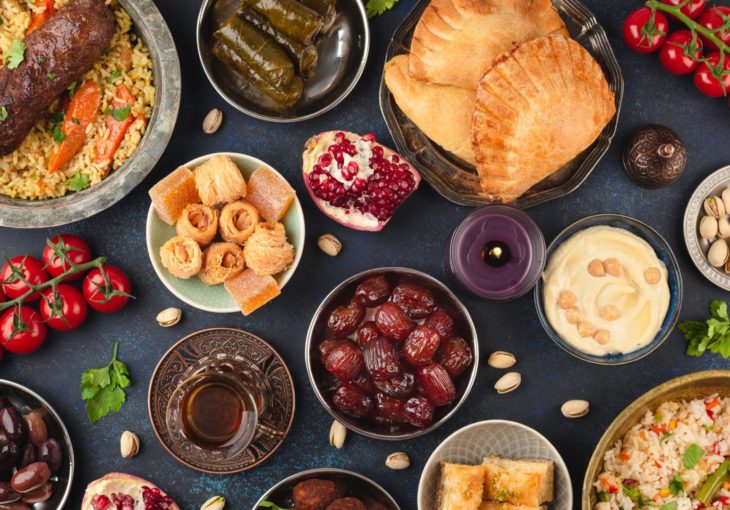The holidays are fast approaching and that means shopping, parties and gatherings with family and friends will fill the calendar in the upcoming weeks.
This time of year is typically wrought with events planned around food. With that, there is a greater chance of eating unhealthily and drinking sugary beverages often with alcohol. According to Asha Thomas, M.D., vice chair of the Department of Medicine and chief of the Division of Endocrinology at LifeBridge Health, this can create the “perfect storm” for people with cardiac issues.
Research studies have shown that there is a 5% to 7% higher risk of cardiac events and cardiac death around the holidays compared to the rest of the year.

Dr. Asha Thomas, vice chair of the Department of Medicine and chief of the Division of Endocrinology at LifeBridge Health. (PHOTO COURTESY LIFEBRIDGE HEALTH)
“The holidays tend to be a time of excess,” Dr. Thomas says. “We tend to eat more in general. We are also eating foods that are saltier, that are richer, and potentially more alcohol is consumed than at other times. Healthy habits are not being followed, putting a lot of strain on the body.”
Unhealthy eating can trigger a rise in blood pressure, and a heart that’s already susceptible may have to work harder. This can predispose the heart to not beating well and cause heart failure during that time of excess, potentially setting up a heart attack, Dr. Thomas explains. It can also be a time of stress, with preparations, family interactions or relationships, and many other factors that may not be routine during the rest of the year.
“So, between excess and stress, it really can sort of lead to a perfect storm for increased heart issues during this time,” Dr. Thomas says.
One key risk factor for heart disease and stroke is diabetes. According to Dr. Thomas, for people who have diabetes, the risk of death from either heart attack or stroke is almost double that of someone without diabetes.
Those who have a diabetes diagnosis or are aware of their cardiac issues like high blood pressure know how to care for themselves through medication therapy and behaviors and foods to avoid, Dr. Thomas says. However, undiagnosed individuals are particularly susceptible because they don’t know how holiday indulgences can affect their health, she explained.
For a heart health holiday season, follow these simple tips:
- Stay physically active. Don’t give up on walks and exercise because of other activities.
- Plan ahead. Have a sense of what might be served at events. Have a snack or a light meal at home to satisfy your appetite before you go to avoid being ravenous and really hungry.
- Be selective. Choose the items that you would like to try in moderation and make good food choices.
- Eat nutritious foods. Healthy items are more satisfying and filling, and good for bowel health.
- Be mindful of sugar intake and calories overall, specifically in alcoholic beverages. Holidays are times when people indulge, and those drinks contain high amounts of sugar.
- Avoid salty foods. Salt triggers thirst and can increase the likelihood of drinking sugary and alcoholic beverages. Salt can put as much of a strain on the body and blood pressure as glucose and sugar, and can tilt susceptible hearts into heart-related issues and heart failure.
- If hosting, include healthy options on the menu. Have fruits available, particularly those that have a lower glycemic index like blueberries, strawberries and blackberries. Prepare desserts that are lighter like angel food cake that tends to have fewer carbohydrates, plant-based snacks and crudités, and an abundance of lean proteins and vegetarian options.
- Water is always important. Make sure there is plenty of water available.
- Prioritize regular schedules for eating and taking medications while holiday shopping or away from home to ensure proper diabetes care.
- Take time for rest, mindfulness, meditation. The holidays can be a lot of anxiety and stress at times. The ability to take some time out and center yourself can reduce stress on the heart.
- Practice healthy hygiene. COVID, flu, RSV and other respiratory diseases are believed to increase risk for heart attacks. People with diabetes are more susceptible. It’s important to continue healthy practices like good handwashing and mask wearing.
- If traveling, make sure to pack extra medication in case of a storm or some bad weather. Keep a second stash of medicines in a different bag in case something happens to them.
Editor’s note: This guest post was provided by LifeBridge Health, a #StrongerHearts Life is Why sponsor. To learn more about the #StrongerHeart initiative, visit: https://www.lifebridgehealth.org/StrongerHearts/StrongerHeartsMD.aspx
